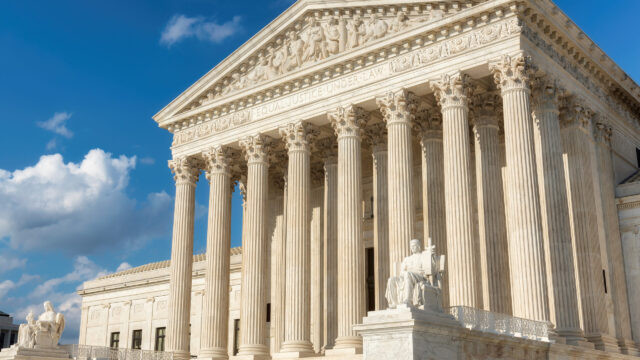SCOTUS Finds No Standing for Plaintiffs in Murthy v. Missouri First Amendment Jawboning Case
June 26, 2024

Today, the Supreme Court issued a decision in Murthy v. Missouri, ruling that the plaintiffs had failed to prove that there was a risk the government would unconstitutionally coerce social media companies to remove their future posts. The decision reverses a lower court injunction that prevented White House and other executive branch officials from certain communications with platforms, clearing the way for government officials to share information with platforms about misinformation campaigns that threaten public health and election integrity.
The Murthy case raised an important question: when do government officials’ communications with social media companies about user-generated speech cross the line from constitutionally informing the platforms to unconstitutionally coercing, or “jawboning,” them? The answer to this is especially important in an election year during which generative AI disinformation is likely to be more influential than ever. The government’s expertise can greatly help platforms fight disinformation, but if the government crosses the line and forces platforms to censor disfavored views, it could endanger online speech.
In ruling that the plaintiffs lacked standing to bring their lawsuit, the Supreme Court left unanswered the underlying legal question, but made clear that any future plaintiffs would need to come armed with greater evidence of the causal link between government action and adverse content moderation decisions if they want their suit to be heard. The plaintiffs in this case claimed that a past history of censorship was evidence that such censorship was likely to continue—but they failed to show that the removal of their posts was due to governmental pressure and that past moderation actions taken against them created the risk of future adverse action. Specifically, while some platforms had deleted some of the plaintiffs’ posts, the plaintiffs failed to show that the platforms acted in response to government requests, either because the platform acted in accordance with policies enacted before any conversations with federal officials, or because the timeline of government request and platform action were unclear.
This is one of many important pending First Amendment challenges to platform governance policies. The Supreme Court is likely to announce decisions in an important duo of cases, Moody v. NetChoice and NetChoice v. Paxton, later this week.

Support Our Work
EPIC's work is funded by the support of individuals like you, who allow us to continue to protect privacy, open government, and democratic values in the information age.
Donate